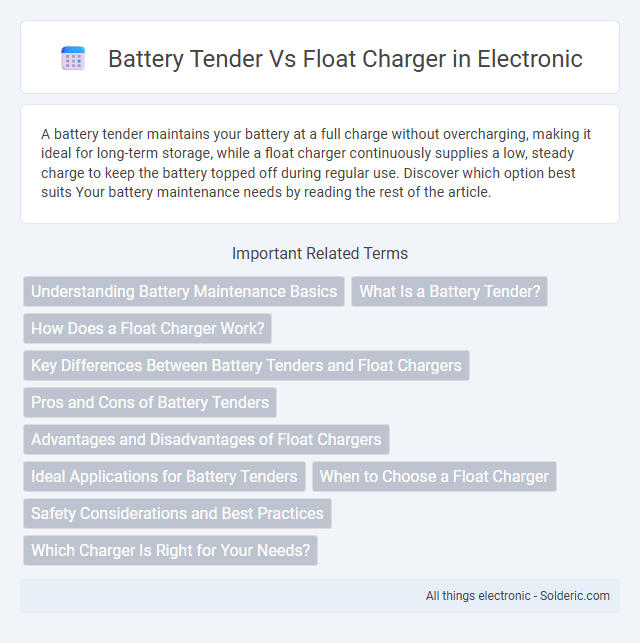A battery tender maintains your battery at a full charge without overcharging, making it ideal for long-term storage, while a float charger continuously supplies a low, steady charge to keep the battery topped off during regular use. Discover which option best suits Your battery maintenance needs by reading the rest of the article.
Comparison Table
| Feature | Battery Tender | Float Charger |
|---|---|---|
| Primary Use | Maintains and charges motorcycle and automotive batteries | Keeps battery at full charge over long periods without overcharging |
| Charging Type | Multi-stage charging (bulk, absorption, float) | Constant low-voltage float charge |
| Overcharge Protection | Yes, automatic shutoff after full charge | Yes, maintains safe charge without overcharging |
| Battery Compatibility | 12V lead-acid, AGM, and gel batteries | Mostly 12V lead-acid batteries |
| Ideal For | Periodic charging and battery maintenance | Long-term battery storage and maintenance |
| Cost | Moderate to high | Low to moderate |
| Example Brands | Battery Tender, NOCO Genius | CTEK, Schumacher |
Understanding Battery Maintenance Basics
Battery tenders and float chargers both maintain battery health by providing a steady, low-current charge to prevent self-discharge and sulfation. Battery tenders are designed for long-term maintenance, automatically switching between charging and resting modes to keep the battery at optimal voltage. Float chargers continuously supply a minimal charge, ideal for vehicles stored for extended periods, ensuring batteries remain fully charged without overcharging risks.
What Is a Battery Tender?
A battery tender is a smart charger designed to maintain your vehicle's battery at an optimal charge level without overcharging, using a microprocessor to monitor voltage and adjust current accordingly. Unlike traditional float chargers, battery tenders provide a precise, regulated charge that prevents battery degradation and extends lifespan, making them ideal for long-term battery maintenance. Their advanced technology ensures your battery is ready for use whenever needed by compensating for natural self-discharge.
How Does a Float Charger Work?
A float charger continuously supplies a low, steady voltage to maintain your battery's full charge without overcharging or damaging it. It monitors the battery's voltage and automatically adjusts the current to compensate for self-discharge, ensuring long-term battery health. You benefit from reliable, maintenance-free battery care ideal for vehicles or equipment in storage.
Key Differences Between Battery Tenders and Float Chargers
Battery tenders and float chargers both maintain battery health but function differently; battery tenders regulate charging by switching between bulk, absorption, and float modes to optimize battery life, while float chargers provide a constant low voltage to keep the battery fully charged without overcharging. Battery tenders typically include smart technology to adjust based on battery condition, preventing damage from overcharging, whereas float chargers deliver a steady voltage regardless of charge state. Choosing the right device impacts your battery's longevity and performance, with battery tenders being more suitable for long-term maintenance and float chargers better for simple, continuous charge needs.
Pros and Cons of Battery Tenders
Battery tenders offer the advantage of maintaining your battery at an optimal voltage without overcharging, enhancing battery lifespan and reliability. They consume minimal power during extended periods of inactivity, making them ideal for seasonal vehicle storage or infrequent use. A major drawback is their slower charging rate compared to traditional chargers, which may be inconvenient if you need a quick battery boost.
Advantages and Disadvantages of Float Chargers
Float chargers maintain a battery at full charge by providing a low, steady voltage, preventing overcharging and extending battery life. They are ideal for long-term storage and maintenance of batteries in vehicles or equipment not in constant use, ensuring readiness without damaging the battery. However, float chargers typically cannot rapidly recharge a deeply discharged battery and require compatible battery types for safe operation.
Ideal Applications for Battery Tenders
Battery tenders are ideal for maintaining charge in vehicles that experience long periods of inactivity, such as classic cars, motorcycles, boats, and RVs. They provide a low, steady current that prevents battery discharge without the risk of overcharging, making them perfect for seasonal storage or infrequent use. This slow charging process preserves battery health and extends lifespan compared to faster chargers used for regular or immediate recharging needs.
When to Choose a Float Charger
Choose a float charger when you need to maintain your battery at full charge over long periods without overcharging, especially for seasonal vehicles, boats, or motorcycles in storage. Float chargers provide a constant low-voltage charge that prevents battery discharge and prolongs battery life by keeping it topped off without causing damage. Your battery's health and longevity benefit most from a float charger when frequent use or charging cycles are not possible.
Safety Considerations and Best Practices
Battery tenders offer advanced safety features such as automatic voltage regulation and short-circuit protection, preventing overcharging and battery damage. Float chargers maintain a steady, low voltage to keep batteries fully charged without risk of overheating, making them ideal for long-term storage. Best practices include regularly monitoring battery terminals for corrosion and ensuring chargers are compatible with the specific battery type to maximize safety and battery lifespan.
Which Charger Is Right for Your Needs?
Battery tenders are ideal for maintaining a fully charged battery during long-term storage by delivering a low, steady charge to prevent overcharging and battery damage. Float chargers are designed for continuous use, providing a constant voltage to keep the battery at optimal charge without degrading its lifespan. Choosing between a battery tender and a float charger depends on your usage pattern; battery tenders work best for seasonal vehicles or equipment stored for extended periods, while float chargers suit batteries that need consistent maintenance in frequently used applications.
battery tender vs float charger Infographic

 solderic.com
solderic.com